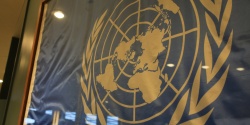Published: 14.11.2022

· The UN Human Rights Council will once again conduct a Universal Periodic Review (UPR) on the protection of human rights in Poland.
· Poland will be reviewed on November 15.
· The review will take into account the country's national report, a summary of UN information on the country and a summary of recommendations from other stakeholders, including NGOs.
· The recommendations for legislative changes prepared for Poland contradict in many places both Polish domestic law and international agreements binding Poland, including human rights agreements.
· Participants in the review demand that Poland, among other things, "eliminate barriers" to access to abortion, "liberalize" abortion law, "special legal protection" for people with homosexual tendencies, or fully implement the Istanbul Convention.
· Representatives of the Ordo Iuris Institute took part in a meeting at the Ministry of Foreign Affairs on the preparation of a national report.
· The Institute then prepared a letter to the ambassadors of UN countries, along with which it forwarded selected publications by Ordo Iuris experts on the issues that were addressed during the work.
The Universal Periodic Review (UPR), is a monitoring mechanism within the UN Human Rights Council to assess the state of human rights in individual countries. Poland will undergo the review tomorrow. The final content of the document will be based on the content of three submitted reports - the country's national report, a summary of UN information on the country and a summary of information from other stakeholders, including NGOs, will be taken into account. Representatives of the Ordo Iuris Institute in June took part in a meeting organized by the Ministry of Foreign Affairs, during which the content of the country report was discussed. In addition, the Institute prepared a letter to the ambassadors of UN countries, along with which selected publications by Ordo Iuris experts were handed over. They substantively analyzed the issues that were the subject of the initially formulated allegations against Poland.
The submitted documents expressed numerous expectations of legislative changes against Poland, including "full implementation" of the Istanbul Convention. Significantly, that document, under the guise of combating violence, introduces demands based on gender ideology into the legal order. Participants also demand the prosecution of hate crimes, especially those motivated by the victim's "sexual orientation" or "gender identity."
An accusation was also made against Poland for "the lack of special legal protection for lesbian, gay, bisexual and transgender people in Polish law." It was also claimed that in Poland, allegedly, "there are no specific rules or standards to ensure equal treatment and safety for lesbian, gay, bisexual and transgender people in schools." Moreover, "there is a lack of legislation explicitly prohibiting homophobic hate speech and hate crimes." In fact, as pointed out in the Ordo Iuris Institute's analysis, the Polish Constitution prohibits discrimination for any reason. The regulations apply to the aforementioned groups just like anyone else, ensuring full implementation of the principles of equality and non-discrimination. The stakeholders also demand "ensuring real access to legal abortion by removing existing barriers and stigmatization of abortion," as well as "adequate monitoring and regulation of the practice of conscientious objection."
The institute provided the ambassadors with publications on the issues raised in the documents presented. These materials address, among other things, the issue of the Istanbul Convention (e.g., the report "Why should Poland denounce the Istanbul Convention?"). Other publications address issues of controversy related to the criminalization of so-called "hate speech" (e.g., the Report "The phenomenon of hate crimes...") or the protection of life.
Among the materials provided by Ordo Iuris are a report and analysis of previous allegations against Poland with the social and legal situation of people with homosexual tendencies. Other publications concern the rule of law and the judicial system in Poland or the situation on the Polish-Belarusian border and illegal immigration.
"In the course of work on the UPR, objections were formulated against Poland, which were largely based on false information or incorrect interpretation of the law. As a result, these allegations build a picture of Poland that is inconsistent with reality. Moreover, as part of the recommended legislative changes, Poland is proposed, among other things, to restrict freedom of conscience, which is contrary not only to our constitutional order, but also to international human rights agreements binding Poland," - Anna Kubacka of the Ordo Iuris Center for International Law points out.
Translated with www.DeepL.com/Translator (free version)

17.04.2025
• The Ordo Iuris Institute has prepared an opinion for the UN as part of a thematic report on surrogacy and its impact on the rights of women and children.

• Representatives of Ordo Iuris took part in the second round of consultations ahead of the 58th Session of the UN Commission on Population and Development (CPD58) on global health policy.

The Court of Appeals in Lublin, Poland, has upheld the verdict of the Regional Court in Radom, sentencing a gynecologist to one year of imprisonment, suspended for three years. The doctor must also pay PLN 6,000 to the State Treasury in legal costs.

The Ordo Iuris Institute has prepared a guide for hospitals and doctors on how to respond to the Guidelines issued by the Minister of Health and the Attorney General regarding the performance of abortions. According to these Guidelines, the health premise that permits abortion can encompass any aspect of health—both physical and mental—including any health ailment.